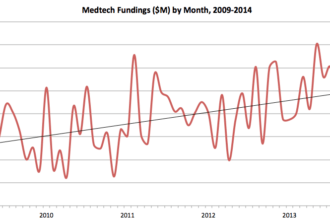As the mobile health apps market explodes, health-conscious consumers have been showered with thousands of tools purporting to help them count calories, track work-outs, control diabetes, quit smoking and so forth.
There are nearly 8,000 health-related apps in the iTunes library alone. Of these, about 60% focus on diet, 20% on exercise, 9% on resistance training and 7% on improving sleep. Although the iTunes app store doesn’t publish download counts, the top free health-related app on the Android Market—an exercise monitoring device known as CardioTracker—has been downloaded between 1 million and 5 million times.
With this panoply of new resources a few clicks away, people have begun to wonder, “Do they actually improve health?”
Perhaps not, sadly. At least not yet. For example, a recent study by mobile health app analyst Pamela Culver revealed that a whopping 26% of people who downloaded a health-related app used it just once (in fairness, many of them probably moved-on to another app). Meanwhile, another study revealed that one-third of those who use health apps do not use them as their developers intended.
Aside from the fact that many health-related apps are as visually appealing as a 1987 version of Super Mario Brothers, there are 2 major reasons why these tools have yet to live-up to their promise. Let’s take a look at them:
Failure to Leverage Clinical Guidelines A galling problem with many health-related apps is that they do not incorporate tried-and-true methods to positively impact the behavior they supposedly target.
A study by George Washington University professor Lorien Abroms and colleagues recently made this point in spades. Abroms’ team reviewed 47 quit smoking apps that were available through the iTunes library. The apps ranged in price from free to $9.99. Nearly a third of them amounted to calendars which counted days since, or days until a quit date. An equal number of apps functioned to calculate dollars saved or health benefits accrued by kicking the habit. The remainder were an unsavory mash-up of cigarette rationing tools, hypnosis tools and, vey is mir, “virtual cigarettes” that people are supposed to use to pretend they are smoking.
Not one of these apps did even a fair job incorporating the highly regarded guidelines promulgated in 2008 by the US Public Health Service for treating tobacco use and dependence. Only 2 of them pointed users to phone-based “quitlines” which have proven to be an effective form of social support, for example. Beyond this, not one of them mentioned drugs that are proven to help people stop smoking.
Remarkably, hypnosis apps were the most frequently downloaded quit smoking tool. “Hypnosis is one of those therapies that people tend to like, but there’s very little evidence that it works,” Abroms said in an interview. “We were sort of troubled to see that what people were going for were kind of the unproven, the unrecommended therapies.”
Failure to Leverage an Effective Behavior Change Paradigm Adherence to tried-and-true clinical guidelines is necessary but not sufficient for a health-related app to be effective. It’s also necessary that the app provide users with links to some form of social support as they effort to change their behavior.
Why? It’s hard work to change a habit, as those who make annual New Year’s resolutions to lose weight can attest. The fun-and-games style that pervades most health-related apps might be engaging initially but as the months go by, it isn’t going to be enough to foster long-lasting changes in behavior.
That’s why apps that link patients with some form of social support—be it a physical therapist who reviews your exercise logs, a dietitian who reviews your food intake, or simply, other folks that are trying to do the same thing as you—are going to end-up being more efficacious.
Behavior change theory is a rich discipline in its own right. Although there are many models for behavior change, in general they are based on the idea that folks go through several steps (for example contemplation, preparation and action) and that at each step, different kinds of social support can be leveraged to assure continued success and progress toward the goal. The models also recognize that people’s motivation can wax and wane over time, and that timely social support can help overcome these roadblocks on the way to change.
So the research is there. We’ll have entered the Health App 2.0 phase of this booming industry when app developers incorporate it on a regular basis!







